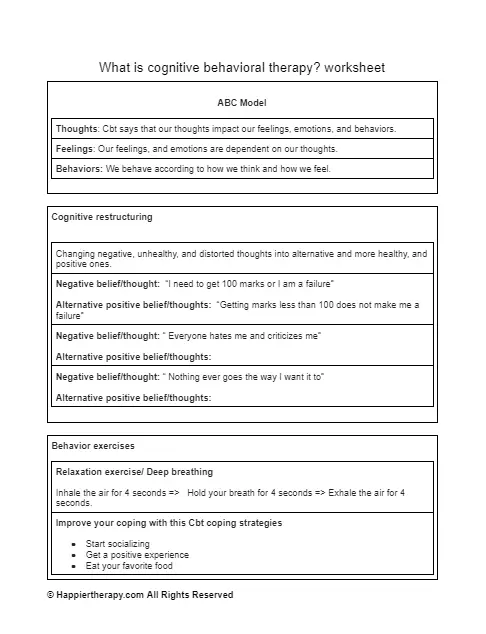When it comes to improving mental health and changing negative thought patterns, cognitive behavioral therapy (CBT) has proven to be highly effective. One of the key tools used in CBT is cognitive behavioral worksheets, which help individuals identify and challenge their negative beliefs and behaviors.
These worksheets provide a structured way for individuals to track their thoughts and emotions, and develop healthier coping strategies. Let’s take a closer look at the benefits of using cognitive behavioral worksheets in therapy.
Cognitive Behavioral Worksheets
1. Self-awareness: Cognitive behavioral worksheets help individuals become more self-aware by encouraging them to identify their thoughts, feelings, and behaviors in specific situations. By tracking these patterns, individuals can gain insight into their automatic responses and learn to recognize when they are engaging in unhelpful thinking.
2. Challenging negative beliefs: Once individuals have identified their negative thoughts and beliefs, cognitive behavioral worksheets provide a framework for challenging and reframing these beliefs. By examining evidence for and against their negative beliefs, individuals can begin to see things from a more balanced perspective and develop more positive and realistic thinking patterns.
3. Building coping skills: Cognitive behavioral worksheets also help individuals develop coping skills to manage their emotions and behaviors more effectively. By practicing new strategies on the worksheets, individuals can learn to respond to challenging situations in a more adaptive way, leading to improved emotional regulation and problem-solving skills.
4. Goal setting: Another key component of cognitive behavioral worksheets is goal setting. By setting specific, achievable goals and tracking progress on the worksheets, individuals can stay motivated and focused on making positive changes in their lives. This process of goal setting and monitoring can help individuals build confidence and a sense of accomplishment.
5. Homework assignments: In addition to in-session work, cognitive behavioral worksheets are often used as homework assignments for individuals to complete between therapy sessions. This helps individuals continue practicing their new skills and applying them to real-life situations, leading to more sustained progress and long-term benefits.
In conclusion, cognitive behavioral worksheets are a valuable tool in the practice of CBT, providing individuals with a structured and effective way to identify and challenge their negative beliefs and behaviors. By utilizing these worksheets, individuals can improve their self-awareness, challenge negative beliefs, build coping skills, set goals, and make lasting changes in their mental health and well-being.
